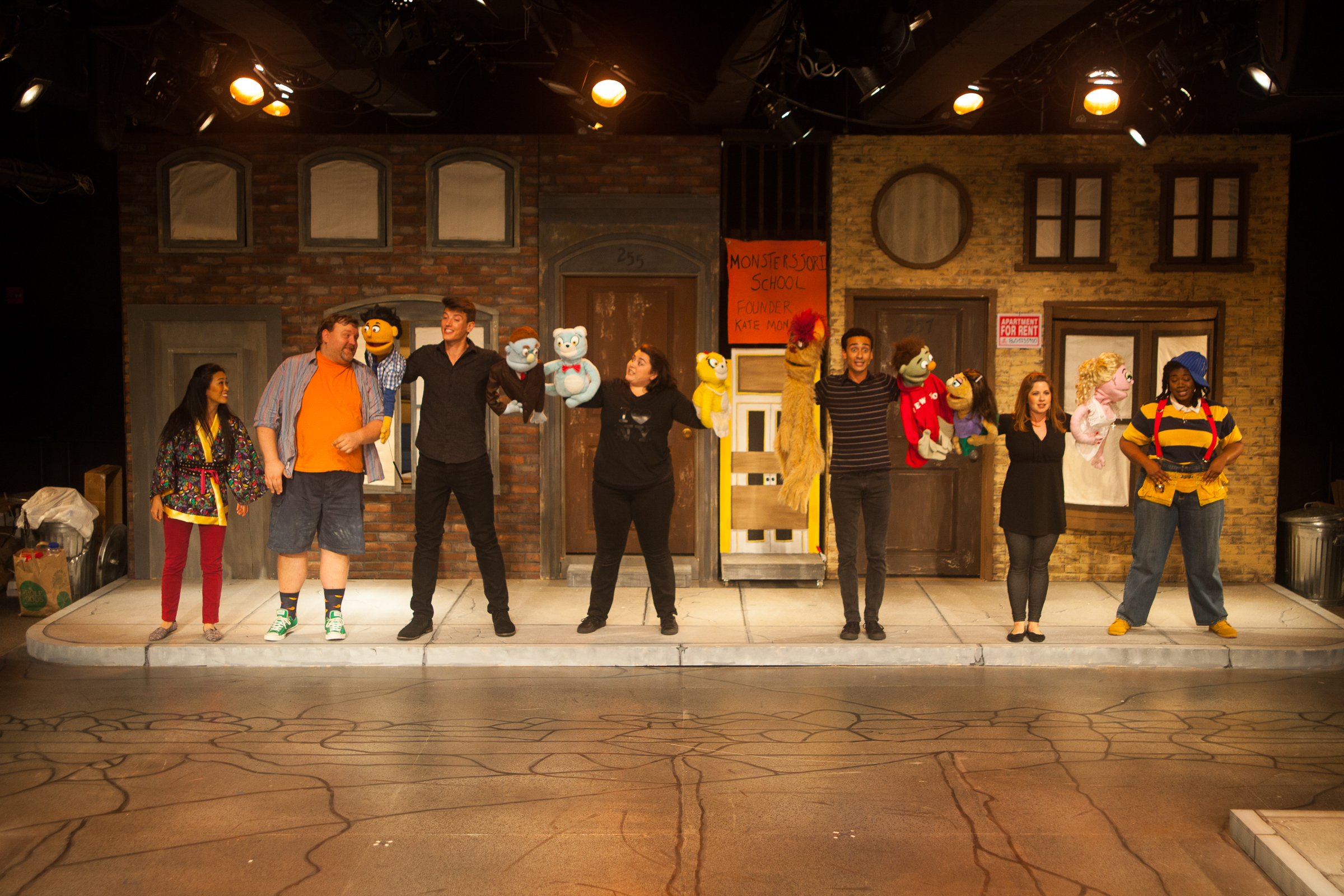Review of Avenue Q, Playhouse on Park
A certain irony creeps into the revival of the Tony-winning hit musical from 2003, Avenue Q, now playing at Playhouse on Park through October 8, directed by Kyle Brand. The brainchild of Robert Lopez and Jeff Marx, who co-wrote the music and lyrics with book by Jeff Whitty, this lively and imaginative musical uses tropes that recall the long-running children’s program Sesame Street to explore the problems of a post-college existence in a less trendy area of Queens. The show’s strong closing song makes the case that most things in life are only “For Now.” That sense of the obsolescence of events and tastes may include, for younger viewers, the show’s key reference points, more than a decade after the show’s initial run.
There are always twenty-somethings, but they aren’t always the same twenty-somethings. The generation that grew up with Sesame Street, and would instantly recognize the name Gary Coleman—represented onstage as the quintessential has-been celebrity by Abena Mensah-Bonsu—is likely to be in its forties, as are Lopez and Marx. The show’s progressive songs, like “Everyone’s a Little Bit Racist” and “If You Were Gay,” effectively mimic the bright-eyed pedagogy of the award-winning PBS show, which aimed to educate and entertain simultaneously. But they must also seem a bit quaint to a twenty-something of today. Since it’s stressed that Avenue Q is not a show for children, its best audience may be those with nostalgic feelings for the turn-of-the-century era.
The cast of Avenue Q (left to right): Christmas Eve (EJ Zimmerman), Brian (James Fairchild), Princeton/Rod (Weston Chandler Long), Bad Idea Bears (Colleen Welsh), Trekkie/Nicky (Peej Mele), Kate/Lucy (Ashley Brooke), Gary Coleman (Abena Mensah-Bonsu) (photos courtesy of Curt Henderson, Imagine It Framed)
Still, it’s a great idea: using the tropes of children's TV to help render the growing pains of young adulthood. Princeton (Weston Chandler Long) must come to terms with the fact that his B.A. in English doesn’t open the doors of opportunity. He’s trying to find his way, helped by neighbors to learn important lessons about getting along, much as would any guest on Sesame Street. A key conceit of the show is that puppets are people, monsters—also played by puppets—live among us, and that some characters will be rendered by live actors.
A major aspect of Avenue Q—and one of the strengths of the Playhouse on Park production—is that the puppeteers are usually the actors and that all are fully visible on stage. This permits the audience to look both at the puppets—as for instance the porn-addict Trekkie (a ribald take-off on Cookie Monster)—and at the actors who manipulate them (for Trekkie, both Peej Mele and Colleen Welsh). Mele is a good example of an actor in service to a puppet: he manifests a variety of entertaining voices for different characters and generally maintains a self-effacing wide-eyed glare as though he were a puppet himself. Welsh, who helps with much of the ancillary puppet-handling, sometimes wielding the puppet another actor is voicing, is a key member of the cast.
The expressive aspects of the simultaneous presence of actor and puppet are particularly effective in Long’s body language for Princeton, and as the more uptight—and closeted—Rod, and in Ashley Brooke’s opposition between sweet Kate Monster and salacious Lucy T. Slut. These two fine actors do a lot, with their movements and their singing voices, to keep this revival fun, romantic, and endearing.
left to right: Peej Mele, Ashley Brooke, Colleen Welsh, Weston Chandler Long (Princeton)
As the live actors—without puppets—Mensah-Bonsu, in a boyish outfit that would suit the diminutive Coleman—steals the show, and she’s abetted by the couple Brian (James Fairchild) and Christmas Eve (EJ Zimmerman). The fact of a mixed-race couple is meant to be progressive as well, but the insistence that Christmas Eve speak broken English makes her a caricature (“The More You Ruv Someone”), and Brian seems to have little purpose other than to be an example of an older slacker (“I’m Not Wearing Underwear Today”).
Nicky (Colleen Welsh), Brian (James Fairchild), Trekkie (Peej Mele), Princeton (Weston Chandler Long), Gary Coleman (Abena Mensah-Bonsu), Christmas Eve (EJ Zimmerman)
While not always progressive, the lessons of the songs follow an arc to make characters confront behavioral norms—whether about efforts to enact or avoid romance (“Fantasies Come True,” “My Girlfriend, Who Lives in Canada”), or about how to face life (“Purpose,” “There is Life Outside Your Apartment”), or how to get it on—puppets Princeton and Kate simulate every variation of heterosexual sex in “You Can Be as Loud as the Hell You Want (When You’re Makin’ Love).” The rueful “There’s a Fine, Fine Line,” sung by Kate, is a high-point, late in Act Two.
The set by Emily Nichols is a perfect rendition of a grittier Sesame Street, with fun fold-down, dollhouse-like sets as backdrops to serve as interiors. The band, let by Robert James Tomasulo, is clear and unobtrusive, and Kyle Brand’s choreography uses the wide-open thrust space well, including a visit into the audience for handouts.
Not quite as dated as the reruns of yesteryear, Avenue Q may inadvertently underscore how timely an experience young adulthood is. The revival at Playhouse on Park is served well by its cast and design and Kyle Brand’s energetic direction.
Avenue Q
Music and Lyrics by Robert Lopez and Jeff Marx
Book by Jeff Whitty
Directed by Kyle Brand
Puppets conceived by Rick Lyons
Choreographer: Kyle Brand; Music Director: Robert James Tomasulo; Lighting Designer: Christopher Bell; Sound Designer: Joel Abbott; Costume Designer: Kate Bunce; Scenic Designer: Emily Nichols; Properties: Pamela Lang; Video Designers: Zach Rosing and Ben Phillippe
Cast: Ashley Brooke, James Fairchild, Weston Chandler Long, Peej Mele, Abena Mensah-Bonsu, Colleen Welsh
Musicians: Nick Cutroneo, guitar; Sean Rubin, bass guitar; Andrew Studenski, reeds; Robert James Tomasulo, keyboard; Elliot Wallace, drums
Playhouse on Park
September 13-October 8, 2017


